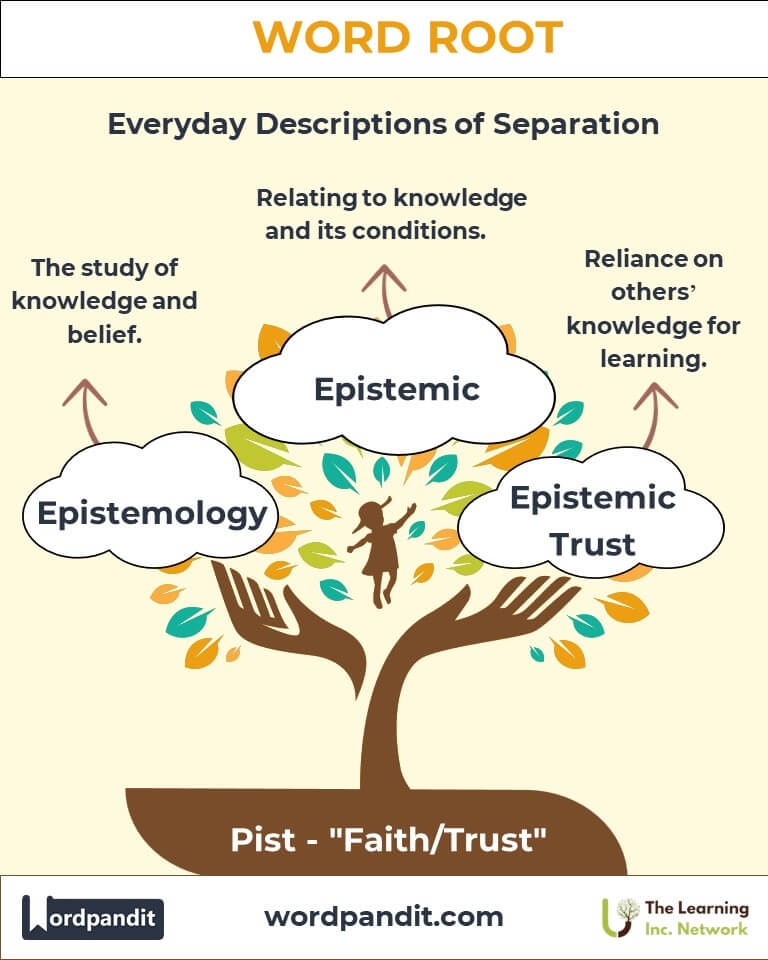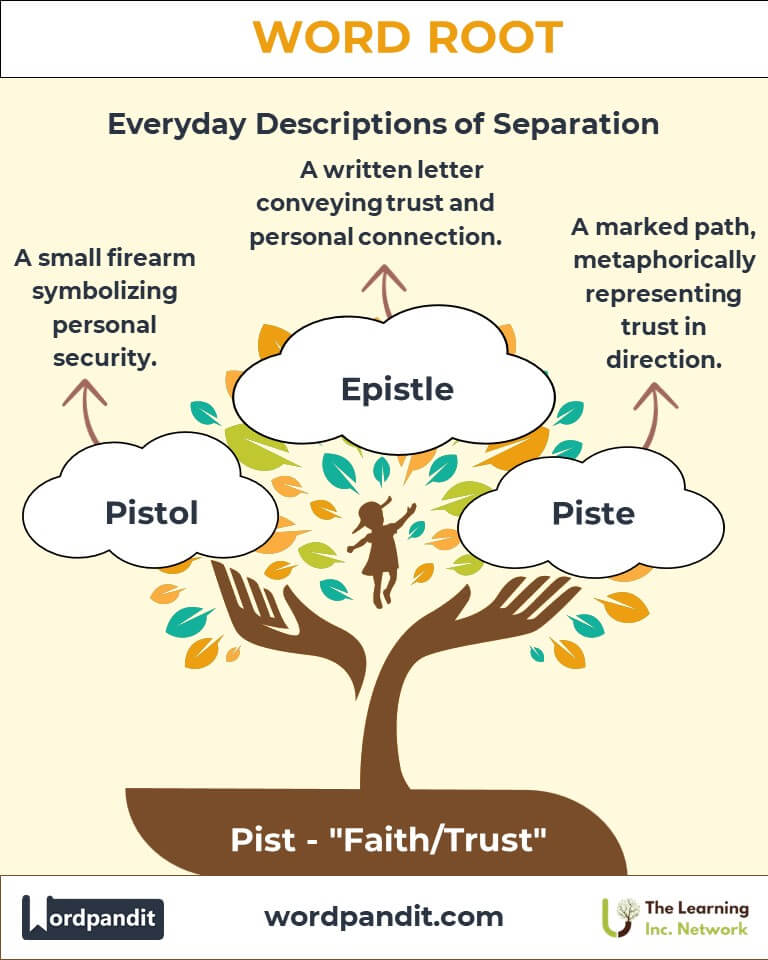Pist: The Foundation of Faith in Words and Philosophy
Discover the depth of the root "pist," meaning "faith," and its profound influence on language and thought. From its role in forming everyday words to shaping abstract philosophical concepts, "pist" connects us to ideas of trust, belief, and certainty.

Table of Contents
- Introduction: The Power of "Pist"
- Etymology and Historical Journey
- Mnemonic: Remembering "Pist"
- Common Pist-Related Terms
- Pist Through Time
- Pist in Specialized Fields
- Illustrative Story: Faith in Action
- Cultural Significance of "Pist"
- The Pist Family Tree
- FAQs about the Root "Pist"
- Test Your Knowledge: Pist Mastery Quiz
- Conclusion: The Timelessness of Faith
1. Introduction: The Power of "Pist"
At its core, the root "pist" resonates with trust, belief, and conviction. Derived from the Greek word pistis, meaning faith or trust, this root underpins a rich vocabulary in philosophy, theology, and linguistics. From terms like "epistemology," which explores knowledge and belief, to "pistol," symbolizing a sense of security, the influence of "pist" reveals its enduring significance.

2. Etymology and Historical Journey
The root "pist" originates from the ancient Greek word pistis (faith, trust). In classical philosophy, pistis described one of the stages of understanding, representing belief or conviction in ideas not yet fully proven. Over centuries, "pist" became integral to theological discourse, reflecting humanity's reliance on faith, whether in divine powers or interpersonal trust.
Its transition into English came through philosophical and theological texts during the Enlightenment. The root's application broadened to include concepts like "epistemology," signifying the study of knowledge—how we come to know and believe.
3. Mnemonic: Remembering "Pist"
To anchor the meaning of "pist," picture a knight holding a shining shield, representing faith as protection and strength.
“Pist stands strong, holding the shield of trust and belief.”
4. Common Pist-Related Terms
- Epistemology (eh-pis-tuh-mol-uh-jee): The study of knowledge and belief.
Example: "Epistemology helps us understand how humans discern truth from illusion." - Pistol (pis-tuhl): A small firearm, originally symbolizing personal security and trust in self-defense.
Example: "The pistol was carefully placed in the case, a relic of historical protection." - Epistemic (eh-pis-teh-mik): Relating to knowledge or the conditions for acquiring it.
Example: "The philosopher posed an epistemic question about reality's nature." - Epistle (ih-pis-uhl): A written letter, often conveying trust and personal connection.
Example: "The epistle carried words of encouragement and faith to the recipient." - Piste (peest): A ski trail or track, metaphorically suggesting a guided path to trust or certainty.
Example: "The skier followed the piste with unwavering confidence."
Pist Through Time
- Pistis (Greek Philosophy): In ancient Greece, pistis described belief in ideas, distinguishing it from knowledge based on empirical evidence. Philosophers like Plato viewed it as a stepping stone toward higher understanding.
- Pistol (Middle Ages): The invention of small firearms introduced the term "pistol," linked metaphorically to trust and personal safety.
- Epistemology (Modern Era): With the rise of scientific inquiry, "epistemology" emerged to explore the nature of belief, shifting "pist" into the realm of intellectual pursuits.
Pist in Specialized Fields
- Philosophy: Epistemology explores belief systems, grounding debates on truth and knowledge.
- Linguistics: Epistle reflects communication rooted in trust and personal faith.
- Psychology: Epistemic Trust investigates how individuals rely on others' knowledge to learn and grow.
- Sports: Piste symbolizes a clear path, aligning with themes of direction and reliance.
Illustrative Story: Faith in Action
In a small village, an old philosopher named Leon was renowned for his teachings on epistemology. One stormy night, a young student questioned, "How can we trust what we do not see?" Leon handed him a lantern and said, "Step onto the piste leading to the chapel. The lantern won't show you the entire path, but it will guide each step. That is pistis—faith in the unseen but trusted." The student understood that belief often illuminates the way when certainty is absent.
Cultural Significance of "Pist"
The concept of pistis has shaped religious traditions, fostering trust in divine providence. Its philosophical legacy continues to influence debates on knowledge, while its linguistic descendants, such as "epistle," remind us of the enduring value of personal connection and faith in human interactions.

The Pist Family Tree
- Cred (Latin: "believe"): Credence (Belief in something as true) and Credibility (The quality of being trustworthy).
- Fid (Latin: "faith, trust"): Fidelity (Loyalty or faithfulness) and Confide (To trust someone with a secret).
- Theo (Greek: "god"): Theology (Study of divine faith and religious belief).

FAQs About the "Pist" Word Root
Q: What does "pist" mean?
A: "Pist" originates from the Greek word "pistis," meaning "faith" or "trust." It forms the foundation for many words that convey belief, conviction, and reliance.
Q: How is "epistemology" connected to "pist"?
A: Epistemology, the study of knowledge, examines how beliefs are formed and justified. Its connection to "pist" lies in exploring the nature of trust and faith in understanding truth.
Q: What does "epistemic" mean?
A: "Epistemic" relates to knowledge or the conditions for acquiring it. It reflects the trust placed in evidence, reasoning, or methods for understanding the world.
Q: How is "pistol" connected to faith?
A: Historically, "pistol" symbolized personal security and trust in self-defense, tying metaphorically to faith in one's ability to protect themselves.
Q: What is an "epistle" and its significance?
A: An "epistle" is a written letter that conveys trust, faith, or personal connection between the sender and the recipient. It highlights the role of communication in building relationships.
Test Your Knowledge: "Pist" Word Root Quiz
1. What does the root "pist" signify?
2. Which term explores the nature of belief?
3. What does "epistemic trust" mean?
4. Which word represents a guided path?
5. What is the historical origin of "pistol"?
Conclusion: The Timelessness of Faith
The root "pist" reveals the profound role of faith in language, thought, and culture. From its philosophical origins in ancient Greece to its presence in modern disciplines, "pist" reminds us of the enduring power of trust and belief. Embracing this root deepens our understanding of the words we use and the convictions we hold.














